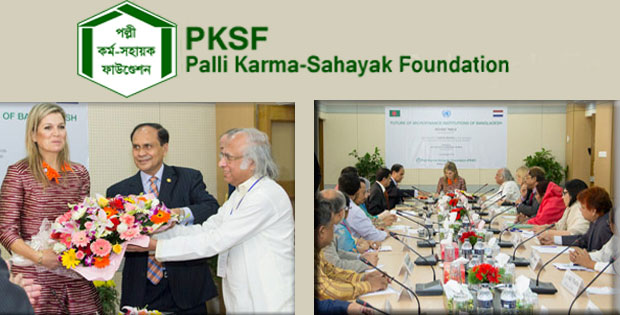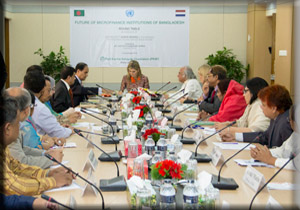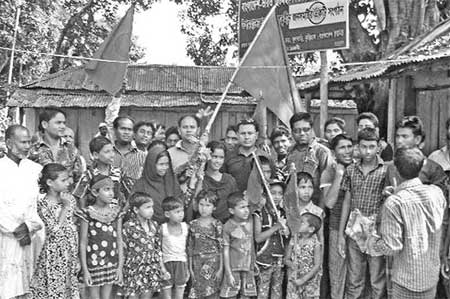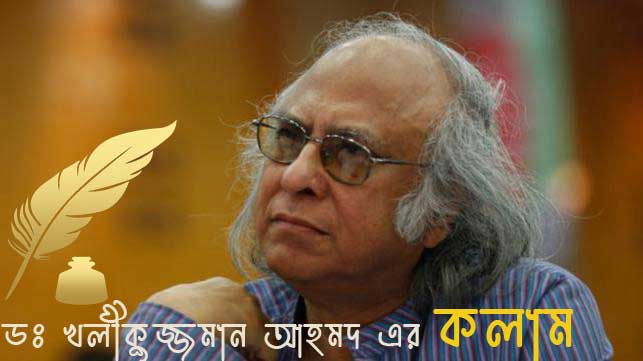Visit to PKSF of Her Majesty Queen Maxima of the Netherlands
Dhaka, 16 November 2015
Discussion Topic: Future of Microfinance Institutions (MFIs) in Bangladesh
Introductory Remarks by : Qazi Kholiquzzaman Ahmad (Chairman, Palli Karma-Sayahak Foundation -PKSF)
Not MFIs, But DFIs
Microfinance Institutions (MFIs) in Bangladesh, particularly those MFIs which are Partners Organizations (POs) of Palli Karma-Sahayak Foundation (PKSF) , now importantly provide, in addition to financing, non-financial services including management and skill training, market information, support for technology choice and access, marketing assistance and other necessary services. These institutions, therefore, are in fact Development Finance and Support Institutions, which may be represented by the acronym DFIs.
Impact of Microcredit/Microfinance
Over the years, studies have produced ambivalent results relating to impact of traditional microcredit/microfinance, which is a small amount of money lent for a year at rather high rates of interest and repayable (both capital and interest) in weekly installments. Certain studies have shown some overall income increase and poverty reduction impacts. Other studies indicate no such positive impacts for the large majority of the traditional micro-borrowers. A study , released in 2010, on microcredit in Bangladesh, sponsored by Microcredit Summit Campaign based in Washington, indicates that, from 1990 to 2008, only 9.4% of the poor micro-borrowers in Bangladesh could rise above poverty line. Many of them are likely tenuously. Of course, some economic improvement has been achieved by many others, but remaining below the poverty line. Also, available evidence suggests that there have been some micro-borrowers, who have fallen into a kind of debt trap, being unable to repay loans taken and then borrowing from other sources to pay that back, thereby becoming increasingly indebted. There are still others who have tended to borrow from several sources, not always successfully, to expand their financial base for undertaking or pursuing meaningful economic activities. It may also be noted that the micro-borrowers, under the traditional microcredit regime, have not generally been provided with other necessary support services along with the small amount of money. As a result, they have in large numbers remained tied to an annual cycle of micro borrowing and repaying for years and years on end, even for decades, without growing out of it.
A more recent international study conducted by J-PAL at Massachusetts Institute of Technology (MIT) and Innovations for Poverty Action (IPA) based in New Haven, USA in seven countries (India, Philippines, Mongolia, Bosnia and Herzegovina, Mexico, Morocco, and Ethiopia), released in February 2015, finds no significant impact of traditional microcredit alone on household income, poverty reduction, women’s employment, and children’s education. However, this study has also found that expanded finance gives households a flexibility to exercise their choices in terms of undertaking beneficial economic activities.
Institute of Microfinance (InM) based in Dhaka has also found in several of its microcredit-focused studies in Bangladesh that enhanced finances along with other services such as training, marketing assistance, etc. bring about significant household income increase and poverty reduction outcomes. This finding related to expanded finance and various non-financial services, as appropriate, is surely a guiding principle concerning the shaping of the future of the sector. The PKSF has already made significant progress in this regard.
Microfinance vs Appropriate Finance
Microfinance is, in fact, microcredit plus few other financial services such as savings and insurance. The amount of money involved is small. Although there is no clear understanding about the ceiling of microfinance, but it is generally understood to be the equivalent of less than US$100 to about US$400. Often, the amounts provided are not very useful for the activities the borrowers intend to undertake or pursue. For purposeful results, a borrower needs finance commemorate with a worthwhile activity. It may vary widely from person to person, depending on their circumstances, abilities, and opportunities. Clearly, both from conceptual and practical points of view, it seems to be more relevant to employ the term ‘appropriate finance’ rather than ‘microfinance’. This means that a person or a household should be lent an amount of money that is a useful basis for them to conduct their activities at a scale that is more purposeful, given what they are able to do, what they intend to do, and what opportunities are there for them.
The ultra-poor may initially be able to utilize properly only small amounts of money—say, the equivalent of up to US$200. They may be given such amounts of money. Those whose circumstances enable them to utilize more money, they should be provided with more, so that they can have a financial base to pursue the purpose of getting out of poverty and moving on to a sustainable development pathway.
But, even an appropriate amount of money alone may not serve the purpose, because the people concerned are also constrained by non-availability of various non-financial services. Hence, other necessary services should also be provided for the borrowers to move ahead socio-economically.
In Bangladesh, the rural economy is flourishing in terms of both agriculture and non-agricultural activities. One particular area, where not only progress has taken place but there is also a tremendous potential for future growth, is the micro enterprise sector. There is already a wide variety of such enterprises in rural Bangladesh. Prospects are there for many other types of micro enterprises in different parts of the country. Such enterprises generate income, savings, and wage employment opportunities. As a result, there is a significant positive impact of these enterprises relating to poverty eradication, disparity reduction, and contribution to national income. Their non-financial and financial needs are obviously larger compared to the ultra-poor.
In recognition of this continuum in terms of different sizes and types of economic activities in existence or likely to come on stream having future growth prospects in rural Bangladesh, the PKSF started providing appropriate finances to households depending on their circumstances, abilities, and planned activities. The upper limit is currently the equivalent of US$12,800.
The PKSF and its POs, therefore, seek to cater to the needs of the extreme poor on one hand and enterprise development on the other. But, in all the cases, other services such as management and skill training, market information and technology-related support, marketing assistance, and other required services are now routinely provided, as appropriate.
Hence, this approach reflects the realities prevailing in rural Bangladesh in particular. But the approach is also relevant for urban poverty eradication and sustainable socio-economic development of the urban poor.
Clearly, therefore, the relevant concept is Appropriate Finance along with other appropriate services, that recognizes the varying needs of the highly differentiated poor and non-poor in Bangladesh in the context of their poverty eradication and progress to a sustainable development pathway.
Multidimensional Poverty
Human living is multidimensional and so is poverty. Clearly, therefore, poverty cannot be addressed properly on the basis of only one dimension. It is, thus, essential that the key dimensions are identified and addressed in an integrated fashion. In fact, most of these dimensions are addressed one way or another in Bangladesh and elsewhere—but often in a disjointed manner. As a result, the outcome is often also disjointed and a momentum is not generated. The multidimensionality of poverty has been recognized in the Sustainable Development Goals programme adopted by the United Nations in September last. The UNDP has been publishing Multidimensional Poverty Indices (MPIs) for countries around the world starting in 2010.
The PKSF has been implementing a multidimensional integrated approach to poverty eradication and development with effect from 2010. The ultimate goal is humanly dignified living for all concerned. Everybody has to be included and nobody excluded. This is also one of the key thrusts of the UN-adopted Global Sustainable Development Agenda.
This PKSF-programme now covers 150 unions (lowest administrative unit). The programme, called ENRICH (Enhancing Resources and Increasing Capacities of the Poor Households towards Elimination of their Poverty) includes appropriate finance for economic activities, health, education, training, encouragement of affordable savings, appropriate insurance or other fall back arrangements for overcoming any losses caused by natural disasters or for other reasons, social capital formation, support for appropriate technology access, infrastructure, local climate action, socio-economic and marketing information, campaign against social evils, etc.
The internal and external evaluations of ENRICH show very encouraging results. A great deal of enthusiasm has been generated among the people of the areas covered and there is strong demand from other unions to be included in the programme. However, as of now, the circumstances of PKSF and its POs do not permit meaningful further expansion. In any case, it is already a large programme.
Inclusive Finance
In Bangladesh, one of the major government policy thrusts is inclusive finance. This means that people, obviously the downtrodden, who do not have access to finance, should be enabled to access finance.
In Bangladesh, and I believe in other developing countries as well, the people, who do no have access to finance, also generally suffer from various non- financial constraints including illiteracy or low level of literacy, lack of skills, little knowledge about how market works, and what technologies are available and how can those be accessed. In other words, they are constrained by information, capability, and technological limitations as well as by a lack of access to
necessary finance. Hence, providing them with a small amount of money cannot be of much avail for them. They also need other services such as education, training, primary health services, market information, access to appropriate technology, marketing assistance etc., as appropriate. It is also important to facilitate affordable savings by the people served and introduce appropriate insurance schemes for them to recoup the losses that they may incur due, for example, to a natural disaster or receive necessary medical services. Hence, in the process of inclusive development, the downtrodden should be enabled to access not only some finances but actually appropriate finances along with other necessary services, some of which have been noted above.




